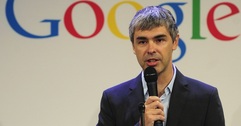
First off, his goals for the company are so ambitious that he admits that Google’s original mission statement (“to organize the world’s information and make it universally accessible and useful”), itself a lofty goal, needs a revision. “We are still trying to work out what it would be,” he says of the revision.
HE WANTS TO CHANGE THE LIVES OF PEOPLE
There’s a reason why Google under Larry Page throws its weight behind the world’s most challenging as well as ambitious projects, besides the fact that Google can now finance them, thanks to its huge cash hoard of $62 billion. Larry Page worries that not enough institutions, especially governments, are invested adequately in such life altering projects. He believes that with the right focus and application, “there’s nothing that can’t be improved and made to run more efficiently”. When FT’s Richard Waters prods him and asks why it has to be Google, Larry answers: “Well, somebody’s got to do it.” Larry believes there are only around 50 investors in Silicon Valley who are chasing breakthrough technologies. He wants Google to have a bigger impact on the world by doing more things.
Larry knows if Google just keeps continuing to do what it knows best, it cannot keep attracting the best talent, and the company itself will eventually lose its relevance. Google wants to be a company which stays at the top of the game for generations.
It’s not, therefore, surprising to find that some of the big bets which Google has placed have the goal of making a clear difference to the lives of people. Some of them are things located on the fringes, which have not received adequate attention, even though they show the promise of delivering big, eg. the driverless car project and diseases that affect older people.
Here are a few of the projects on which Google is working on in its ‘moon shot’ factory, the Google X division headed by Sergey Brin:
• The driverless or self-driving cars
• High-altitude wind turbines
• Project Loon with its stratospheric balloons to blanket the world with internet access
• A life-sciences start-up which is creating nanoparticles that can be introduced inside the human body to monitor diseases.
The start-up acquisitions made by Google also align with its tendency to paint on a huge canvas.
• Nest, which is building fully-automated homes
• Calico, a pharma company working to stop ageing
• Robotic companies Boston Dynamics and Schaft, which bring out four- and two-legged robots
Apparently, Page looks at Google’s portfolio as a bucket of investments. Some offer short-term returns. But others require medium- or long-term commitment. This type of risk is within the comfort zone of Larry, who is after all, an ardent admirer of investor legend Warren Buffett.
A DIFFERENT KIND OF LEADER
Larry is different from the conventional CEO. Management questions like how to organize people and how to motivate them are very important for Larry. Given all the talent which Google has within its ranks, it would be a crime in his eyes if the company were to do the same things all over again, and not something new. For instance, when the leader of Project Loon expressed confidence that if everything were to go well, Google might be able to increase the internet’s total bandwidth by 5%, Page retorted by asking him why Google couldn’t double or triple the global capacity. Astro Teller of Google X was quoted in Fortune as saying, “He wants to make sure there is a moon shot after a moon shot. Reminding us that his ambitions are high helps people aspire to more.” Andy Conrad, a Googler who heads the nanoparticles project, is quoted by Fortune as saying, “You feel terrified, inspired, and nurtured at the same time.”
Ben Horowitz, storied Venture Capitalist and partner of Andreessen Horowitz, says about Larry, “We have not seen this kind of business leader after Thomas Edison at GE and David Packard at Hewlett-Packard.”
One way by which he makes his staff think differently, the Fortune article says, is by encouraging his engineers and product managers to spend at least one day of the week with just their mobile phones. He himself spends much of his time every day away from his desktop. He wants to motivate and push his people forward all the time.
Recently he set a challenge before the product management team at Gmail led by its manager Alex Gawley: Gmail is good, but it was created before smartphones and social networks came along, so create a new communications service for the next 10 years. “Don’t think about creating Gmail 2.0,” Page told the team. Early results of this challenge are already out, and the encouraging response to their email app called Inbox shows they are on the right track.
Page is attracted by what the Fortune article describes as the zero-million-dollar research problem — an interesting challenge that no one is working on. Andy Conrad explained one of his traits, “Larry looks at one or two ways in which a problem should be solved and places very strategic bets on both.” That is why the start-up acquisition Calico focuses on extending the maximum lifespan, even as Conrad’s nanoparticles group works on median lifespan by trying to ward off illnesses.
“I’ve never had a conversation where he wasn’t at least in danger of being ahead of me, even in the areas I spend way more time on than he does,” says Teller of Google X. Larry himself is aware of the impression he leaves on his engineers and scientists. Hence, he tries to be as learned about everything which they are doing as possible. He explains, “Deep knowledge from your manager goes a long way towards motivating you. And I have a pretty good capability of that.”
e.o.m.
 RSS Feed
RSS Feed
